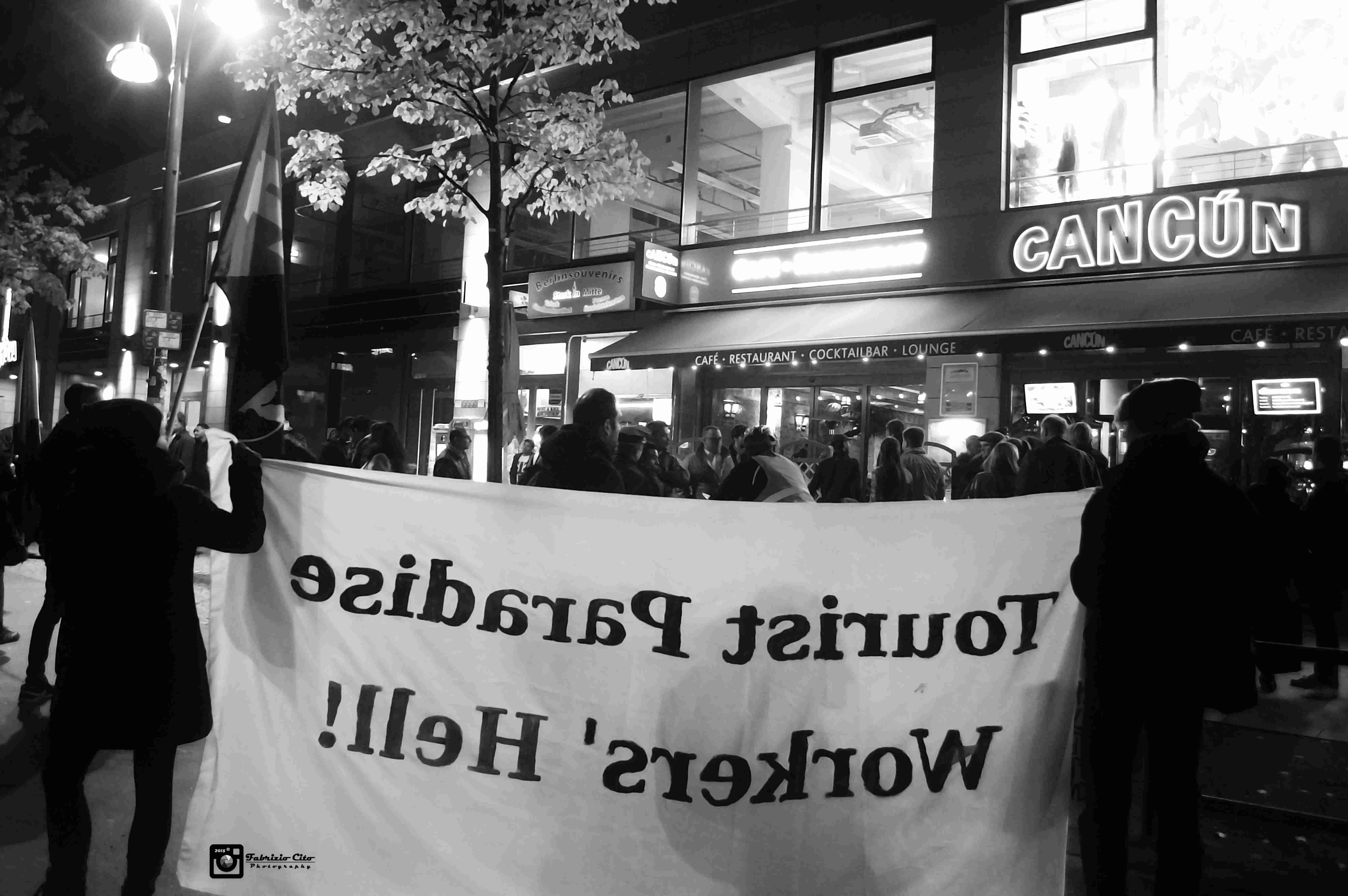Germany’s capital city is no stranger to migrant worker exploitation, and perhaps within no other industry this is more evident than the gastronomy sector. Every year thousands of migrant workers arrive in the city, hoping to find secure and dignified employment and to earn a decent wage. Many of them will find themselves waiting the tables or working within the kitchens of the restaurants that profit so well from the city’s status as a major tourist destination. But in these restaurants working conditions are often precarious, with workers facing long shifts, low pay and contracts worth less than the paper they’re written on.
FAU Berlin once more found itself in the midst of such a struggle, as the popular and centrally located Cancún restaurant attempted to withhold outstanding wages and holiday pay of a union member. What followed was a textbook example of direct action, resulting in a conclusion that was to the affected worker’s satisfaction; another victory for the FAU in what has been a successful few months.This FAU member had been working in Cancún restaurant for almost nine months, between October 2014 and July of the following year, before eventually choosing to leave his place of employment. There was a constant stream of issues, including problems with being paid on time (or in full), working hours that were inconsistent and irregular and employees that were often treated with absolute contempt by the owner and his management staff. One waitress had a mug of hot chocolate slapped from her hand due to its incorrect preparation and was sacked on the spot. FAU claimed on behalf of its member a small four-figure amount – peanuts to a thriving restaurant in the centre of Germany’s capital, but a significant sum for the worker. It consisted mainly of absolutely indisputable unpaid payments for holiday leave.The comrade had been working under the conditions of a zero-hour contract – perhaps familiar to readers from the UK, the US or Finland – meaning he was not guaranteed a minimum number of hours to work per month. Written into the contract was an indemnity of 1000 Euros if a worker were to quit without at least two weeks’ notice. The member tried to quit on multiple occasions and was ignored. In response, and apparently as a punitive measure, he got his hours cut. The FAU itself tried on several occasions, both in spoken and written form, to present the claims of its member. Jeanette Shek and Badol A. Shek, managers of the restaurant, denied ever having received a letter.In response to this, ten members of the union visited Mr Shek in October at the restaurant with another letter, placing it directly in his hands in front of a room full of customers and his staff. His reaction was one of incredulity, and he even attempted to order one of his underling managers to lock the doors and seal the FAU members into the restaurant. This tactic did not bear fruit. It was clear to the FAU members present that there was no further option but to escalate the struggle.
Tactical escalation, decisive victory
A couple of weeks later, around 40 people – members of the FAU and others – gathered outside Cancún restaurant to picket the customers and employees and raise a general awareness of the working conditions within the establishment. When the FAU members arrived they were not alone. Badol Shek had gathered together a group of counter-demonstrators and scabs, whomever he had at his disposal (numbering around fifteen or twenty), in an attem
pt to intimidate the assembled demonstrators. Despite this attempt, the picket was a complete success, with passers-by and customers alike drawn to the spectacle. FAU members handed out flyers and leaflets to leave the audience with no doubt as to the meaning of what they were seeing.
With onlookers stopping to talk and discuss the issues with the assembled FAU members and associates, the managers of Cancún restaurant could see that their situation was only worsening with each passing minute. After another half an hour, they sent out representatives with over a thousand euros to pay the worker. They had been utterly humiliated, and to be defeated so publically and on their own doorstep was truly a marvel to behold. Although the victory was a decisive, the struggle within the gastronomy industry is an ongoing one. Working conditions in Berlin are precarious at the best, but restaurant owners in particular know that for every dissenting worker there are twenty others ready to step in and replace them, desperate to earn a living. Direct action in this instance has once more produced the goods, and it is up to us to continue to act collectively to continue thwarting capitalistic exploitation of workers wherever it exists.

